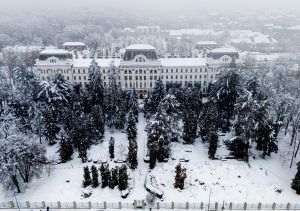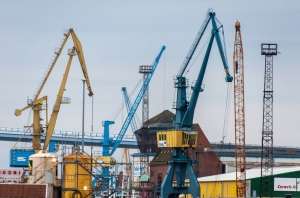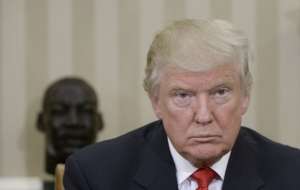The press is not the fourth estate
MAKE (Translated by Cosmin Ghidoveanu)
Ziarul BURSA #English Section / 20 iunie 2012

Calling the media "the fourth estate" is insulting, because it works to keep the citizens informed, and to crystallize the public opinion based on which the population makes decisions, as an expression of its power; the power of the people is the only political power, in a regime which is called precisely that: "the power of the people" -; it is precisely to ensure the "power of the people" that the separation of the powers of the state was designed for.
As such, the press serves a function of the democratic system and is not a separate power, except when it becomes a propaganda agent of one of the powers in the state (or of some of their subsidiaries, including here the propaganda of the opposition and of the big business groups); in that case, the press disqualifies itself, becoming a vector of the three estates of the state, attacking democracy, which becomes constricted.
Even though it is a feature of the contemporary democracies, the principle of "separation" is never strictly applied, as the estates sometimes overlap, to various degrees, going from dictatorship, to a minimum level which is supposed to guarantee the ability of the people getting their will heard.
The temptation get the estates of the state to blend - in other words, to limit democracy - is stimulated by the economic weakness, which, by weakening the power of the state, set of its self-adjustment function to allow it to survive (of course, despotism, tyranny, and autocracy are other factors behind that).
The world financial crisis, which, in Europe has transformed into a crisis of the weakness of countries when it comes to their solvency, gives us the opportunity to empirically illustrate the evolution of the weakening of democracy, a temptation well demonstrated by the reduction of the freedom of the press over the last five years.
We can see that in the four years of crisis, the number of countries with limited freedom of the press added 3-3.5% to each of the extreme categories, which, overall, in terms of numbers, leads to a lower freedom index, and in terms of quality, represents a correction which hints at a shift in the structure of the world's democracy:
The Eurozone however, displays the hardest crippling of the freedom of the press:
We note that in the 17 states of the Eurozone, only one country - Estonia - has kept its ranking, 5 countries improved it, and 11 became more restrictive, or even intolerant to the freedom of the press.
In the group of the most solvent countries, Belgian democracy suffered the biggest damage; in the second and third solvency category, where countries unanimously denounce the freedom of the press, it bears noting the collapse of the freedom of the Slovakian democracy, but particularly of the Italian one. I don't know if the improvement in the freedom of the Cypriot press is due to the huge findings of hydrocarbons, in the country's sea, but on the other hand, the choking of the press in Malta, Portugal and Greece are in line with the insolvency of the group to which they belong.
Nowadays, the Greek press much resembles the one in Romania: after the sacking of thousands of journalists and the bankruptcy of dozens of media institutions, the media market is divided between a few moguls which have little concern for informing the public fairly (not a peep about the popular protests), pluralism of opinions (one of them serenely stated that failure to pay off the country's debt justified foreclosure - failing to neglect however that it would lead to the country being torn apart). These strings of empirical indices suggest strong correlation between economic development and democracy. On the other hand, an idea with many supporters among researchers, argues that democracy fosters economic growth, so that, under this assumption, limiting press freedom also leads to a loss of potential growth, on top of the economic losses generated by the crisis.
• The European democracy
Renate Weber, in a working document of the Commission for Civil Freedoms of the European Union, of June 11th, 2012 (eight days ago), announces that the European Commission has dragged its feet and then abandoned the project (launched in January 2007) to ensure the media pluralism, in spite of the repeated urges of the European parliament; the document mentions that recently, European Commission vice-president Neelie Kroes has initiated a group for reviewing the freedom and pluralism of the press, an act which the document views as a step forward.
Indeed, the heads of the European Union, aren't that concerned with democracy, even though they march under its banner: that was obvious when it came to the vehement reaction to the idea of a referendum in Greece, and before that, in the manner in which they make decisions and propose ideas by going over the heads of the European people - fiscal union, banking union, even a European government.
In fact, in the talks which I had in Belgium, with leaders of the international journalist associations, I have been assured that the media manipulation, practiced on the journalists stationed in Brussels, has reached perfection and it even uses maneuvers which are not yet being used in Romania.
............
• The public warning on the crisis
WHAT CHANCE DOES THE DOLLAR HAVE?
• Ben and Hank go to Beijing
BURSA 11.12.2006, Călin Rechea
The policy of the "strong dollar", always proclaimed but never argued by the Treasury of the US, has lost its credibility.
A series of recent forecasts indicate a 70% likelihood of recession in the USA for the year 2007.
How will the global economy react, with its real interest rates close to historical lows and with its liquidity surplus, in the event of a recession in America?
.........
This article, the same as the ones we published later, warning against the likelihood of a crisis, weekly, have attracted the dislike of the public, first against the author, (who was constantly insulted), and then against the BURSA newspaper itself, meaning that I even received emails on my personal address, to stop publishing his article claiming he was "bad for the nerves".
Why is that?
The explanation appears in the following quote:
"As late as July 2007, staff considered that "global expansion [would] remain strong" and they revised upwards the outlook for growth, while drawing attention to growing vulnerabilities in some emerging
markets. The financial market turbulence in early 2007 was seen as "not warrant[ing] a fundamental reassessment of the global outlook" (March 2007), a view that the IMF also conveyed to the G-20 and G-7."
(Independent Evaluation Office of the International Monetary Fund - 2010)
Following this evaluation, the IMF publicly apologized for the fact that, despite the studies of its own experts who were warning about the imminence of the crisis, it did not warn the governments of its 188 members.
The inexcusable delay of the IMF in signaling the crisis, has made the independent journalists, and in our case, the BURSA newspaper itself, look like practicing a dangerous extremism, playing the part of the party pooper.
In some recent studies, the press is accused of having played a harmful part in the onset of the sovereign debt crisis.
Which creates the opportunity for debate: are journalists responsible, if the publication of the correct information generates disasters, whether they are political, social or economic?



















































